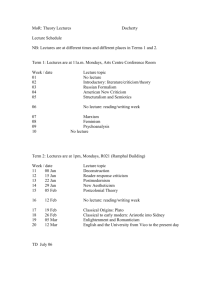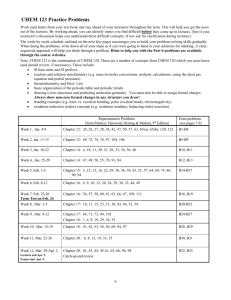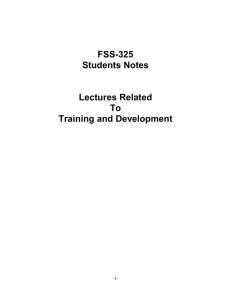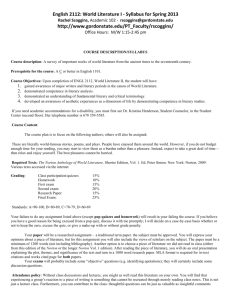American Government and Politics - Department of Political Science
advertisement
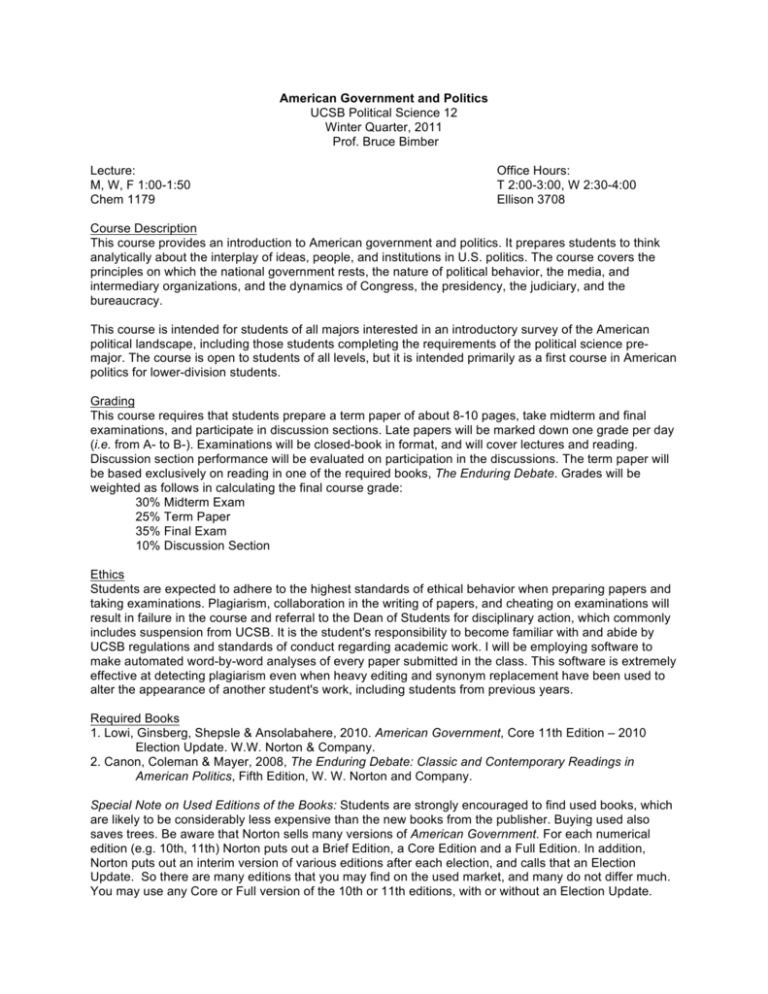
American Government and Politics UCSB Political Science 12 Winter Quarter, 2011 Prof. Bruce Bimber Lecture: M, W, F 1:00-1:50 Chem 1179 Office Hours: T 2:00-3:00, W 2:30-4:00 Ellison 3708 Course Description This course provides an introduction to American government and politics. It prepares students to think analytically about the interplay of ideas, people, and institutions in U.S. politics. The course covers the principles on which the national government rests, the nature of political behavior, the media, and intermediary organizations, and the dynamics of Congress, the presidency, the judiciary, and the bureaucracy. This course is intended for students of all majors interested in an introductory survey of the American political landscape, including those students completing the requirements of the political science premajor. The course is open to students of all levels, but it is intended primarily as a first course in American politics for lower-division students. Grading This course requires that students prepare a term paper of about 8-10 pages, take midterm and final examinations, and participate in discussion sections. Late papers will be marked down one grade per day (i.e. from A- to B-). Examinations will be closed-book in format, and will cover lectures and reading. Discussion section performance will be evaluated on participation in the discussions. The term paper will be based exclusively on reading in one of the required books, The Enduring Debate. Grades will be weighted as follows in calculating the final course grade: 30% Midterm Exam 25% Term Paper 35% Final Exam 10% Discussion Section Ethics Students are expected to adhere to the highest standards of ethical behavior when preparing papers and taking examinations. Plagiarism, collaboration in the writing of papers, and cheating on examinations will result in failure in the course and referral to the Dean of Students for disciplinary action, which commonly includes suspension from UCSB. It is the student's responsibility to become familiar with and abide by UCSB regulations and standards of conduct regarding academic work. I will be employing software to make automated word-by-word analyses of every paper submitted in the class. This software is extremely effective at detecting plagiarism even when heavy editing and synonym replacement have been used to alter the appearance of another student's work, including students from previous years. Required Books 1. Lowi, Ginsberg, Shepsle & Ansolabahere, 2010. American Government, Core 11th Edition – 2010 Election Update. W.W. Norton & Company. 2. Canon, Coleman & Mayer, 2008, The Enduring Debate: Classic and Contemporary Readings in American Politics, Fifth Edition, W. W. Norton and Company. Special Note on Used Editions of the Books: Students are strongly encouraged to find used books, which are likely to be considerably less expensive than the new books from the publisher. Buying used also saves trees. Be aware that Norton sells many versions of American Government. For each numerical edition (e.g. 10th, 11th) Norton puts out a Brief Edition, a Core Edition and a Full Edition. In addition, Norton puts out an interim version of various editions after each election, and calls that an Election Update. So there are many editions that you may find on the used market, and many do not differ much. You may use any Core or Full version of the 10th or 11th editions, with or without an Election Update. Also note that American Government can be purchased in ebook format from Norton. We are using the Fifth Edition of The Enduring Debate. Unfortunately previous editions are not acceptable, as the table of contents has changed substantially from the Fourth and prior editions. Optional Websites Below the reading for each topic you will find listed one or more "Optional Websites." These links are intended for students who wish to know more about the topic first-hand. The material at these websites is intended as a starting point for exploration and surfing on the topic. Material here will not appear on the exams or be required for your paper, but is intended for helping interested students pursue topics beyond the course itself. Online Study Aids The publisher of American Government, W.W. Norton Company, provides a web site called "StudySpace" with a variety of study aids. You may (or may not) find these helpful in mastering the material in American Government. Be aware that these will provide no assistance with material in lectures, most of which does not summarize or duplicate the content of American Government. This is especially important if you rely on the practice tests, because examinations in PS 12 will cover material from lectures and The Enduring Debate that is not covered in the Norton Study Space. Also, examinations in PS 12 will not necessarily follow the format or style of the material there. You are accountable for the substance of the book itself; if you find that the Norton Study Space helps you learn what is in the book, then take advantage of it. But be aware there is no substitute for developing your own skills and judgment at how to assimilate and understand large amounts of material. Special Assistance If you experience difficulty in this course for any reason, please do not hesitate to consult with me or with any of the following student services. Campus Learning Assistance Service helps students through course-specific tutoring and academic skills development. Building 477 9-5 daily. 893.3269 Counseling & Career Services offers counseling for personal & career concerns, self-help information and connections to off-campus mental health resources. 893.4411 Student Health Social Services provides a range of services to help students identify and overcome obstacles to academic performance stemming from financial, medical, emotional, social, or family situations. 893.3380 Disabled Students Program provides academic support services to eligible students with temporary and permanent disabilities. Please inform me if you require special classroom accommodations due to a disability. You must register with DSP prior to receiving these accommodations, and you must re-register each quarter. 893.2668 Schedule of Reading Jan. 3 Lecture 1: Introduction and Overview of the Course (no reading) Jan. 5 Lecture 2: Government, Power, and Freedom American Government (A.G.), Ch. 1 Suggested Website: Google News, New York Times Jan. 7 Lecture 3: The Structure of Democracy in the U.S. A.G., Ch. 2 Enduring Debate (E.D.), Ch. 3, Daniel Elazar, “The Three Political Cultures” Suggested Websites: Freedom House, Political Maps Jan. 10 Lecture 4: Federalism A.G., Skip Ch. 3; Begin Reading Ch. 4 for the next two lectures E.D., Ch. 13, George Annas, “Jumping Frogs, Endangered Toads, and California’s Medical Marijuana Law” Suggested Websites: State of California, County of Santa Barbara Jan. 12, Lectures 5 & 6: Civil Liberties & Civil Rights 14 A.G., Ch. 4 E.D., Ch. 75, Jonathan Rauch, “Objections to These Unions” Suggested Websites: Protect Marriage, Equality California Jan. 19, Lectures 7-9: Congress 21, 24 A.G., Ch. 5 E.D., Ch. 22, David Mayhew, “The Electoral Connection” E.D., Ch. 23, Hibbing and Theiss-Morris, “Too Much of a Good Thing” Suggested Website: Library of Congress Jan. 26, Lectures 10 & 11: The Presidency 28 A.G., Ch. 6 with “Analyzing the Obama Presidency” E.D., Ch. 27, Richard Neustadt, “The Power to Persuade” Suggested Website: American Presidency Project at UCSB Jan. 31, Lectures 12 & 13: The Bureaucracy Feb. 2 A.G., Ch. 7 E.D., Ch. 32, James Q. Wilson, “Bureaucracy” Suggested Website: USA.gov Feb. 4, 7 Lectures 14 & 15: The Judiciary A.G., Ch. 8 Suggested Websites: Supreme Court, Oyez Feb. 9 Midterm Exam In-class, closed-book. Bring a large Blue Book. Feb. 11 Lecture 17: Public Opinion A.G., Ch. 9 E.D., Ch. 42, Richard Morin, “Choice Words” Suggested Websites: RealClearPolitics, Pew Research Center for the People & the Press Feb. 14, Lectures 18-21: Participation, Campaigns, and Elections 16, 18, A.G., Ch. 10 with “Analyzing the 2010 Midterm Elections” 23 E.D., Ch. 49, Louis Menand, “The Unpolitical Animal” Suggested Website: California Secretary of State, Rock the Vote, Mobilize.org Feb. 25 Lecture 22: Political Parties A.G., Ch. 11 E.D., Ch. 56, Morris Fiorina, “What Culture Wars?” E.D., Ch. 57, James Q. Wilson, “How Divided Are We?” Suggested Websites: Democratic Party, Green Party, Libertarian Party, Republican Party, Freedom Works (Tea Party) Feb. 28 Lecture 23: Interest Groups A.G., Ch. 12 Suggested Websites: AMA, National Association of Manufacturers, MoveOn, NRA, AARP, Sierra Club Mar. 2, 4, 7 Lectures 24-26: Media A.G., Ch. 13 E.D., Ch. 43, Scheufele and Tewksbury, “Framing, Agenda Setting, and Priming” E.D., Ch. 46, Markus Prior, “News vs. Entertainment” Suggested Websites: Media Watch, Independent Media Center, Reporters Committee for the Freedom of the Press Mar. 9 Lecture 27: Reform of Government in the US A.G., Appendix A1, The Federalist Papers #10 and #51. E.D., Ch. 62, David Truman, “The Alleged Mischiefs of Faction” E.D., Ch. 63, Jonathan Rauch, “The Hyperpluralism Trap” Suggested Website: National Archives, Public Citizen Term Paper: Due 1pm Mar. 9 Mar. 11 Lecture 28: Conclusion No New Reading Mar. 17 Final Exam: Thursday, Mar. 17, 4-7pm
